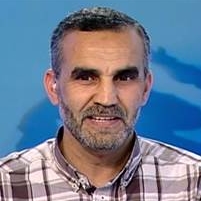The Man Behind a Landmark Case: Finding a Life after 7 Years’ False Imprisonment at Guantánamo
Sunday, May 27, 2012
 Lakhdar Boumediene (photo: MSNBC)
Lakhdar Boumediene (photo: MSNBC)
Two thousand, six hundred sixty-two days: That is how long the United States held innocent man Lakhdar Boumediene at the prison camp for “terrorists” at Guantánamo Bay, Cuba, from January 20, 2002, to May 14, 2009. Although by early 2004 one of his interrogators admitted to Boumediene that two years of “enhanced” interrogation had convinced investigators that he was no terrorist, the government imprisoned him for five more years. It took a Supreme Court ruling, in the case of Boumediene v. Bush, to free him, and even then he had to wait 11 months from the date of the court decision to his actual liberation. The case, by a vote of 5-4, established the right of Guantánamo prisoners to challenge their imprisonment.
Today, more than a decade after his arrest, the Executive Branch of the U.S. government has never admitted its mistake in detaining Boumediene.
An aid worker employed by the Red Crescent Society of the United Arab Emirates to work with orphans in Sarajevo, Bosnia, the Algeria native Boumediene was arrested, along with five other men, by Bosnian authorities at the request of the U.S. in October 2001, just weeks after the terrorist attacks of September 11, 2001. Initially accused of planning an attack on the U.S. embassy in Bosnia, Boumediene and the others were released by Bosnian courts for lack of evidence in January 2002, but immediately kidnapped off the street by American forces and flown to Cuba.
Boumediene arrived in France on May 15, 2009, and lives in Nice with the wife and two daughters from whom he was taken, and a son born two years ago. He has learned to drive and received vocational training, but he has had trouble finding work because of his association with Guantánamo.
Beaten on arrival at Guantánamo Bay and tortured during questioning, he went on a hunger strike and was force-fed for the final 28 months of his detention. Boumediene nevertheless “has no hate for the American people,” Nathalie Berger, a doctor who worked with him after his release, told The New York Times, although the same cannot be said of his feelings about former President George W. Bush.
-Matt Bewig
To Learn More:
After Guantánamo, Starting Anew, in Quiet Anger (by Scott Sayare, New York Times)
My Guantánamo Nightmare (by Lakhdar Boumediene, New York Times)
Court-Ordered Freedom for Guantánamo Prisoners Stops at D.C. Court of Appeals (by David Wallechinsky and Noel Brinkerhoff, AllGov)
Boumediene v. Bush (Oyez)
- Top Stories
- Unusual News
- Where is the Money Going?
- Controversies
- U.S. and the World
- Appointments and Resignations
- Latest News
- Trump Offers to Return Alaska to Russia
- Musk and Trump Fire Members of Congress
- Trump Calls for Violent Street Demonstrations Against Himself
- Trump Changes Name of Republican Party
- The 2024 Election By the Numbers






Comments